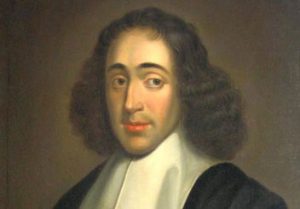The BEST: Spinoza

The BEST: Tractatus Theologico-Politicus by Benedict de Spinoza
Summary: Published anonymously in 1670, and banned a few years later, Spinoza wrote a letter describing the Tractatus Theologico-Politicus (TTP) as presenting “my views regarding Scripture,” but the book does far more than that. Its writing was occasioned by what was, in Spinoza’s eyes, an urgent need to address religiously motivated political strife in the Dutch Republic. Thus, he goes on to specify, it aims to “expose the prejudices of the theologians,” to combat accusations of atheism (a charge he always vigorously denied), and most centrally to argue for the “freedom to philosophize.” It begins with theology, dealing with how he understands the Tanakh’s presentation of topics such as prophecy, miracles, and divine law, lambasting in the process medieval Jewish rationalists – Maimonides in particular – for forcing Tanakh into an ill-fitting Aristotelian straitjacket. He then continues with an influential early presentation of Biblical criticism. But the biblical content, substantial though it is, is ultimately just setting the scene for the book’s political goals. For on the basis of his conviction that the Bible presents only the barest of theologies – that there is one omnipresent God the worship of whom “consists solely in justice and charity” (TTP, chapter 13) – Spinoza can argue that since the Bible itself barely cares to police our theologies, the state should similarly only regulate the behavior of its citizens, not their theologies or philosophies. The path is thereby cleared for Spinoza to present his version of a social contract argument that limits political power to justify freedom of thought, a limit that at the same time best serves political stability, since “peace and piety are endangered by the suppression of this liberty” (TTP, Preface). While the resulting Spinozan state is someway from granting the broad freedoms of religion we today enjoy, the Tractatus is seen as an important early step along the path to liberal democracy.
Why this is The BEST: It would clearly be a gross understatement to say that R. Jonathan Sacks has no stock with Spinoza’s rejection of the divine authorship of the Torah and denial of the continuing validity of mitzvot (or the “ceremonial law” as Spinoza puts it). Yet, R. Sacks acknowledges that Spinoza was both one of the “makers of the modern mind” (Will We Have Jewish Grandchildren, 11) and “one of the first great theorists of liberalism” (To Heal a Fractured World, 89).
Spinoza’s defense of liberty and toleration – which R. Sacks notes, in still granting the state “draconian powers” (The Politics of Hope, 71) did not go far enough – would lead to the classical liberalism that R. Sacks calls “one of the great achievements of human civilization” (ibid., 75). However, without a shared morality, the negative liberty for which he takes Spinoza to be arguing will not alone hold civil society together, and it is over how to provide that shared moral underpinning that Spinoza and R. Sacks differ fundamentally.
It is of great significance to R. Sacks, and an idea that he was often at pains to repeat, that Spinoza presents us with a characteristically penetrating insight into the nature of Judaism. For while Spinoza dismisses mitzvot as merely being the political law of the ancient Jewish state that lost their binding force once the state fell, the flipside is his recognition that this “discipline of difference… had been a key to Jewish survival” (One People, 28). Spinoza recognized that abandoning the commandments “meant abandoning membership of the Jewish people” (One People, 35).
The centrality of mitzvot for Judaism is clearly a contention with which R. Sacks wholeheartedly agrees. Where he comes apart from Spinoza decisively is in his evaluation of this truth. Spinoza’s enlightenment universalism meant Jewish particularism was an obstacle to peace and thus to be eliminated. Spinoza dismisses tradition in favor of universal rationality, whether in his opposition to mitzvot or to the divinity of the Torah. As R. Sacks tells us, Spinoza “rejected the authority of tradition in understanding sacred texts” (Crisis and Covenant, 182). Other than the obvious religious objections that he would have to this, for R. Sacks it is only through our membership of traditions, via religions and particular communities, that we can acquire the very universal values that will lead to the peaceful, just society that both he and Spinoza desire. Spinoza had correctly identified the centrality of Jewish law for the survival of Judaism. Where he went wrong was in thinking that eliminating it is the path to a moral society. R. Sacks showed us that maintaining mitzvot and retaining particularity rather than flattening it is the way to secure a just society – for Jews and for humanity in general.
Daniel Rynhold is Dean and Professor of Jewish Philosophy of the Bernard Revel Graduate School of Jewish Studies, Yeshiva University.
 Read more about The BEST or about the R. Sacks Bookshelves Project. Sign up here to receive an automated notice when each essay in this series posts. The R. Sacks Bookshelves Project is presented in cooperation with the London School of Jewish Studies.
Read more about The BEST or about the R. Sacks Bookshelves Project. Sign up here to receive an automated notice when each essay in this series posts. The R. Sacks Bookshelves Project is presented in cooperation with the London School of Jewish Studies.

